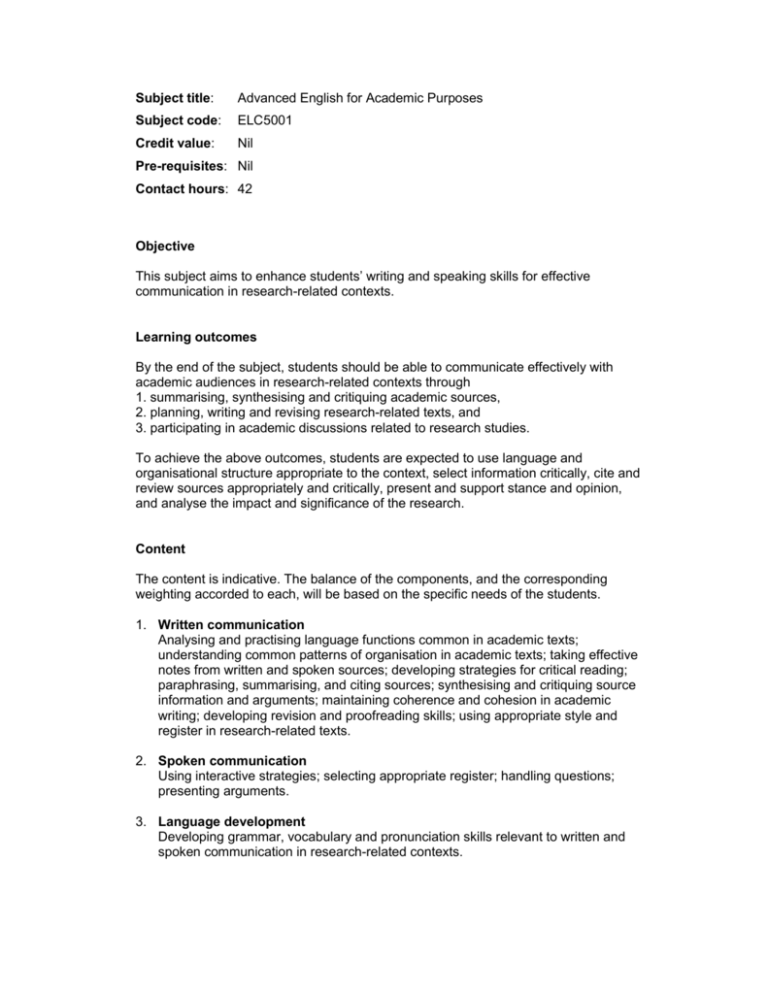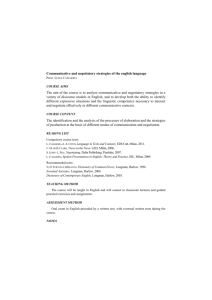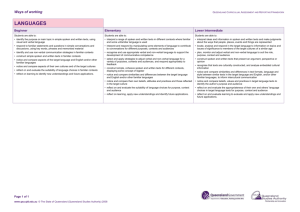
Subject title:
Advanced English for Academic Purposes
Subject code:
ELC5001
Credit value:
Nil
Pre-requisites: Nil
Contact hours: 42
Objective
This subject aims to enhance students’ writing and speaking skills for effective
communication in research-related contexts.
Learning outcomes
By the end of the subject, students should be able to communicate effectively with
academic audiences in research-related contexts through
1. summarising, synthesising and critiquing academic sources,
2. planning, writing and revising research-related texts, and
3. participating in academic discussions related to research studies.
To achieve the above outcomes, students are expected to use language and
organisational structure appropriate to the context, select information critically, cite and
review sources appropriately and critically, present and support stance and opinion,
and analyse the impact and significance of the research.
Content
The content is indicative. The balance of the components, and the corresponding
weighting accorded to each, will be based on the specific needs of the students.
1. Written communication
Analysing and practising language functions common in academic texts;
understanding common patterns of organisation in academic texts; taking effective
notes from written and spoken sources; developing strategies for critical reading;
paraphrasing, summarising, and citing sources; synthesising and critiquing source
information and arguments; maintaining coherence and cohesion in academic
writing; developing revision and proofreading skills; using appropriate style and
register in research-related texts.
2. Spoken communication
Using interactive strategies; selecting appropriate register; handling questions;
presenting arguments.
3. Language development
Developing grammar, vocabulary and pronunciation skills relevant to written and
spoken communication in research-related contexts.
Teaching and learning approach
The course is designed to introduce students to the language and skills they will need
to present their research studies effectively. A major emphasis is on improving
students’ confidence and competence in grammar, vocabulary and pronunciation in
these contexts.
The study method is primarily seminar-based. Activities include teacher input as well
as individual and group work involving writing practice, evaluation of texts, minipresentations and discussions. Practical work will involve analysing texts such as
journal articles and theses that are relevant to students’ research areas, and students
will be provided with opportunities to apply the language skills acquired to the
preparation of their own thesis. Students will be referred to information on the Internet
and the ELC’s Centre for Independent Language Learning.
Learning materials developed by the English Language Centre are used throughout
this course. Additional reference materials will be recommended as required.
Assessment
Continuous assessment: 100%
Students’ oral and writing skills are evaluated through assessment tasks related to the
learning outcomes. Students are assessed on the accuracy and the appropriacy of the
language used in fulfilling the assessment tasks, as well as the selection and
organisation of ideas.
Indicative references
Billingham, J. (2003). Giving presentations. Oxford: Oxford University Press.
Carter, R., Hughes, R. & McCarthy, M. (2000). Exploring grammar in context: Upper
intermediate to advanced. Cambridge: Cambridge University Press.
Hyland, K. (2006). English for academic purposes: An advanced resource book.
Longman; New York: Routledge.
Madden, C. & Rohlck, T. (1997). Discussion and interaction in the academic
community. Ann Arbor, MI: University of Michigan Press.
Meyers, A. (2005). Gateways to academic writing: Effective sentences, paragraphs
and essays. White Plains, NY: Longman.
Oshima, A. & Hogue, A. (2006). Writing academic English (4th ed.). White Plains, NY:
Pearson/Longman.
Weissberg, R. & Buker, S. (1990). Writing up research: Experimental research report
writing for students of English. Englewood Cliffs, NJ: Prentice Hall Regents.
Zwier, L. J. (2002). Building academic vocabulary. Ann Arbor, MI: University of
Michigan Press.









